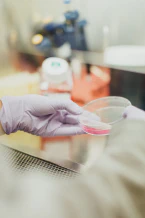The Power of Hugging Your Gross Curiosity.

The Fascinating History of Fertility Drugs: From Nuns to Nobel Prize
It’s hard to believe that one of the first fertility drugs was made from the urine of Catholic nuns. Yes, you heard that right! Back in the 1950s, scientists were interested in isolating fertility hormones from the urine of postmenopausal women to help women struggling to conceive. However, there was a big problem - finding a sufficient amount of urine from older women was not an easy task.
But, Bruno Lunenfeld, a doctor and researcher, didn’t give up. He and his colleagues went to the Vatican to get special permission from the Pope to collect urine from hundreds of older Catholic nuns. And with that, Lunenfeld was able to isolate the hormones needed to develop fertility drugs.
Fast forward to today, and those same hormones can now be synthesized in a lab. But, the fact that the discovery was made from nun’s urine is still fascinating. It’s a testament to the innovative nature of science and the lengths scientists will go to make breakthrough discoveries.
As someone who’s always been fascinated by science, I can tell you that the story of fertility drugs is just one example of the unexpected discoveries we can make when we explore the gross side of life. It’s easy to feel squeamish or embarrassed when talking about things like urine, but it’s important to remember that science often requires exploring the uncomfortable or taboo.
The discovery of fertility drugs is not the only one to have come from gross stuff. Take the California brown sea hare, for example. This sea slug squirts bright purple ink at predators, but it also has one of the largest neurons in the animal kingdom, making it perfect for neuroscience research. And, scientist Eric Kandel used these sea slugs in his research, leading to a Nobel Prize.
So, don’t be afraid to hug your fascination with gross stuff. Whether it’s urine or sea slugs, we never know what we might find when we peel back the layers of disgust. And who knows, your curiosity might just lead to the next big breakthrough in science.
The Importance of Talking About Gross Stuff for Education and Curiosity
Talking about gross stuff can be a great tool for education and an excellent way to preserve curiosity. As a child, I was fascinated by gross stuff, and my love for science started with a slime chemistry set and gross experiments in biology class. However, many kids are discouraged from exploring the gross side of life as adults step in and tell them not to pick their noses or touch certain things in the backyard.
Engaging with gross stuff can be seen as transgressive, but as humans, we’ve extended the concept of disgust to morality. We categorize things like bodily fluids, sex, physical abnormalities, and death as gross, which reminds us that we’re just animals. Many of us internalize this link between disgusting things and immorality, and it can leave us with deep existential angst.
But if we de facto associate gross stuff with immorality, we lose a huge part of our curiosity because there is so much out there in the world that is a little bit gross. We should be talking about gross stuff early and often with young people so that they feel like they’re allowed to claim a bigger picture of life on our planet. There are cycles of decay driving forest growth, and there are networks of fungus beneath our feet connecting literally all of the plants around us. It’s amazing.
The fascination with gross stuff doesn’t exactly go away, but as adults, we often pretend like it’s not there. However, we all spend a big part of our lives trying not to be gross. We’re just like bags of fluids and some weird tissues surrounded by a thin layer of skin, and we’re constantly trying to avoid being gross. Yet, talking about gross stories is a socially acceptable way to explore the gross side of ourselves.
It’s essential to talk about gross stuff because it can help people feel comfortable talking to a doctor about their own bodies. Doctors and the scientific community can only address issues when they know there’s something to address. However, there are still gaps in what we know, just because no one was there to ask a question. We need to let people know that it’s alright to have agency over their bodies and health.
Overall, talking about gross stuff is crucial for education and preserving curiosity. It’s a socially acceptable way to explore the gross side of ourselves and can help people feel comfortable talking to doctors about their own bodies.
How Disgust Became Linked to Morality: The Psychology of Grossness
Have you ever wondered why certain things just make us feel grossed out? According to psychologists, our sense of disgust is not only related to our physical health but also linked to our morality. We have learned to associate bodily fluids, sex, physical abnormalities, and death with immorality, and it can be unsettling to think that we are just animals. As a result, we often avoid talking about these gross things to protect our souls.
Unfortunately, this mindset can limit our curiosity and prevent us from exploring the bigger picture of life on this planet. As we grow older, we internalize these associations between grossness and immorality, and it affects our ability to question and learn. We begin to worry about our own bodies and feel ashamed of the things we cannot control.
However, it’s important to remember that as humans, we are just bags of fluids surrounded by a thin layer of skin. We spend a significant amount of time trying not to be gross, but we should hug our fascination with gross stuff. It’s a socially acceptable way to explore the gross side of ourselves and learn about the world around us.
When we peel back the layers of disgust, we can find remarkable things. For example, sea hares, a type of sea slug, are hermaphrodites that mate in groups of up to 20 individuals. They have a small number of large neurons that make them excellent for neuroscience research, and studying them has led to a Nobel Prize.
By talking about gross stuff and exploring it with curiosity, we can learn more about ourselves and the world around us. We can remove the stigma associated with bodily functions and create a more open and accepting dialogue about our health. Don’t be afraid to ask questions and hug your fascination with grossness because you never know what you might find.
Why Encouraging Curiosity About Gross Stuff in Kids is Important
As a child, I was what you might call a “gross kid.” I loved conducting gross experiments in my biology class, swabbing surfaces around the classroom and culturing the bacteria we collected. However, as we grow older, society’s expectations of what is “acceptable” behavior kick in, and we start to internalize this notion that “gross” things are taboo. Kids begin to associate disgust with immorality and start to push the boundaries to find out what is and isn’t acceptable.
This shame can lead to a loss of curiosity, which is a shame because there is so much out there in the world that is a little bit gross. It’s important to talk about gross things early and often with young people, so they feel like they’re allowed to claim this bigger picture of life on our planet. The fascination with gross stuff doesn’t go away as we age; we just pretend like it’s not there.
There’s a bigger issue here too. Many of us take this voyeuristic delight in learning about gross things because it’s a socially acceptable way to explore the gross side of ourselves. But there’s another reason that talking about gross stuff is so important. It’s about agency over your own body and health.
Young people and adults alike should feel comfortable talking to a doctor about their own bodies. Doctors and the scientific community can only address issues when they know there’s something to address. Unfortunately, there is still a lot we don’t know about certain things, like menstruation. In part, that’s just because there weren’t a lot of scientists in the field who were women to ask questions about it. And it’s also not a topic that women talk about publicly. So there’s this gap in what we know, just because no one was there to ask a question.
Encouraging kids’ curiosity about gross stuff can help them to understand and claim their own bodies and health. We should let them know that it’s alright to have agency over their own bodies, which can lead to more comfortable conversations with doctors in the future. Plus, we never know what we’re going to find when we peel back all those layers of disgustingness!
Tonsil Stones and Menstruation: Breaking Taboos and Encouraging Discussions
Talking about bodily functions can be uncomfortable or even taboo in many societies, but it’s important to encourage open discussions about them. This includes topics like tonsil stones and menstruation.
Tonsil stones are small, whitish-yellow lumps that can form in the crevices of the tonsils. They are not harmful, but can cause bad breath and discomfort. Menstruation is a natural bodily process that occurs in people with a uterus, but it is often stigmatized and misunderstood.
By breaking the taboo surrounding these topics and encouraging discussion, we can help people feel more comfortable seeking medical help or support when they need it. It’s important to educate ourselves and others about these bodily functions and to normalize discussions about them.
Menstruation, for example, is a normal and healthy part of the reproductive cycle, and it’s important to educate young people about it so that they can better understand their bodies and feel confident seeking medical advice or support. Similarly, discussing tonsil stones openly can help people feel less embarrassed and more comfortable seeking medical help if needed.
Breaking down taboos and encouraging conversations about bodily functions can also lead to important advancements in research and treatment. By destigmatizing these topics, we can help ensure that people receive the care and support they need.
The Importance of Basic Research on Taboo Topics
Research on taboo topics like menstruation is often overlooked or underfunded. However, it is essential to advance our knowledge and understanding of the human body and improve the lives of millions of people worldwide.
Basic research on menstruation can lead to the development of new treatments and products for menstrual-related conditions, such as endometriosis and polycystic ovary syndrome. It can also provide insights into the link between menstruation and other health issues, such as heart disease and breast cancer.
But funding for this type of research is often scarce, and many researchers struggle to find support. This lack of investment can have negative consequences, including a lack of progress in developing new treatments and a limited understanding of the complexities of menstruation.
It’s important to break the silence surrounding taboo topics like menstruation and to encourage basic research in these areas. By doing so, we can improve our understanding of the human body and develop new treatments and products that can improve the lives of millions of people.
Exploring the Surprising Discoveries Found in Gross Stuff
Did you know that some of the most groundbreaking discoveries in science were made by studying gross stuff? It may sound counterintuitive, but examining the disgusting and repulsive can lead to profound insights and discoveries.
One of the most famous examples of this is the discovery of the neurotransmitter serotonin, which is involved in regulating mood and many other physiological functions. This discovery was made by studying the nervous system of the sea slug, a creature that many people would find revolting.
Another example is the discovery of the circadian rhythm, which is the body’s internal clock that regulates our sleep-wake cycles. This discovery was made by studying the behavior of fruit flies, which many people find annoying and gross.
The fact is that exploring the weird and revolting can often lead to unexpected and fascinating discoveries in science. By studying the things that make us cringe and feel uncomfortable, we can gain valuable insights into the workings of the natural world.
So the next time you encounter something gross or disgusting, don’t turn away in disgust. Hug your curiosity and explore the strange and fascinating world of science that lies within.
Hugging Your Fascination with Gross Stuff: The Benefits of Owning Your Curiosity
Many of us have a fascination with gross stuff, whether it be the satisfying feeling of popping a pimple or the intrigue of a gruesome crime scene. However, society often tells us that these interests are weird or inappropriate. In reality, owning our curiosity can have numerous benefits for our mental health and even lead to scientific discoveries.
For starters, hugging our fascination with gross stuff can help us feel more comfortable with our bodies and bodily functions. We often hide or feel ashamed of bodily processes such as sweating or farting, but acknowledging and exploring these aspects of ourselves can lead to a greater understanding and appreciation of our bodies.
Additionally, studying gross stuff can lead to scientific discoveries and advancements. For example, the study of sea slugs and their ability to regrow their heads has led to research on brain function and regeneration. The discovery of bacteria living in extreme conditions has led to advances in medicine and biotechnology.
By owning our curiosity and exploring gross stuff in a safe and responsible way, we can gain a greater appreciation for our bodies and the natural world. So next time you feel the urge to indulge in something “gross,” don’t be afraid to hug your curiosity and see where it takes you.
Conclusion
In conclusion, hugging our fascination with gross stuff can be a powerful tool for learning, discovery, and personal growth. From breaking down taboos around menstruation and tonsil stones to unlocking groundbreaking discoveries in neuroscience and fertility treatments, the benefits of owning our curiosity are manifold. By examining our own reactions to the “gross” and recognizing the role that societal norms and cultural conditioning play in shaping our perceptions, we can expand our minds and broaden our horizons. Whether we’re scientists, educators, parents, or simply curious individuals, there’s much to gain from exploring the fascinating world of gross stuff. So next time you feel a twinge of disgust, take a moment to pause, reflect, and consider the potential that lies beneath. Who knows what fascinating discoveries await?






